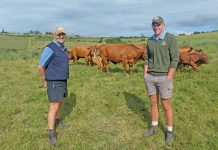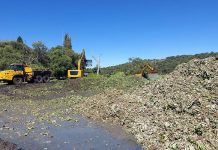With business confidence in South Africa dropping to levels last seen in October 2003, many economists are concerned the country is moving into a recession, with some arguing that it’s already there.
This comes after the recent business confidence index released by the SA Chamber of Commerce and Industry (SACCI). H owever, Business Unity South Africa (Busa), of which Agri SA is a member, said it’s too early to use what they call the “r-word”.
“Although the focus has recently been on the sharp decline in consumer spending, Busa’s evaluation of SA’s economic prospects is based on the still-positive outlook for agriculture this year, as well as the apparent greater reliability in electricity supply in the months ahead,” their report read.
While the definition of a recession is two or more consecutive quarters of negative growth, financial analysts, including the Treasury’s director-general Lesetja Kganyago, said rumours of a recession are baseless, as growth was expected to slow down to between 2,5% and 3,5% from last year’s 5,1%. Agricultural Business Chamber economist Lindie Botha, who compiles the Agricultural Business Confidence Index, said an economic slowdown was beneficial for agriculture in the short to medium term as people become more dependent on resources and slowed their spending.
“It really is the best time to be in agriculture, despite some of the current policy hurdles,” she said. “And right now, while the currency is weaker, exports will boom.” – David Steynberg
SA’s first organic Méthode Cap Classique
Avondale Bio-LOGIC Winery in Paarl IN the Western Cape recently launched South Africa’s first Méthode Cap Classique (MCC) wine to be made from organically grown grapes. The Bio-Logic concept entails restoring soil balance using soil fungi and organisms. No chemical sprays or synthetic fertilisers are used. Instead, ducks and wasps patrol the vineyards for snails and insects, while cover crops are used to control weeds. “With our other wines showing the effect of this soil naturalisation over the past seven years, we took up the challenge of creating a naturally fermented MCC wine,” said owner Johnathan Grieve. “We not only see the Avondale Brut as an extension of the range, but deem its quality to be an endorsement of the Bio-approach.” – Wouter Kriel
Illovo defies economic challenges with good profits
Despite the global volatility of raw sugar price, exchange rates and escalating production costs, Illovo Sugar Limited achieved good financial results for its business year ended 31 March 2008. I ts total revenue increased from R6,26 billion for 2006/07 to R6,79 billion, while its operating profit increased from R1,03 billion to R1,06 billion. n his address at Illovo’s 2008 annual general meeting, chairperson of the board Robbie Williams announced that headline earnings had increased by 16% to R599,6 million and headline earnings per share increased by 15% to 171,6c.
“The reform of the EU sugar regime continues to take effect. Since implementation, domestic sugar quota renunciations there have amounted to 5,6 million tons, which is only 400 000t below the European Commission’s target for quota withdrawals,” he said. “The various economic partnership agreements and duty-free/quota-free access to the EU from least-developed countries will benefit our operations, as much of our expansion activity is underpinned by the anticipated increase in sugar tonnages that Swaziland, Malawi, Zambia, Mozambique and Tanzania will be able to export to the EU under the reform package.”
llovo announced that although its KwaZulu-Natal South Coast operations had been severely affected by the recent floods, rapid repairs had been undertaken and two affected sugar mills were now back in operation. Williams pointed out that for the 2008/09 financial year, the Illovo Group’s total sugar production was forecast to be around 2 million tons, which is over 200 000t more than the figure for 2007/08.
Williams concluded that the group’s results for the current year would again be impacted upon by the level of the rand against other international currencies, particularly of the US dollar. However, the group anticipated a growth in earnings for the 2008/09 financial year. – Lloyd Phillips








